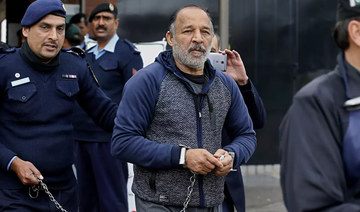MINDANAO: “Our time on the battlefield is over.” With these words, Al-Haj Ibrahim Murad, interim chief minister of the Bangsamoro Autonomous Region in Muslim Mindanao (BARMM), launched the decommissioning of Moro Islamic Liberation Front (MILF) fighters and weaponry.
The ceremony, held earlier this month, was witnessed by the President of the Philippines Rodrigo Duterte. During the event, 1,060 MILF combatants, wearing blue shirts with the word “decommissioned” printed on the back, were presented to Murad — the chief executive of the Bangsamoro regional government — along with 960 surrendered firearms and heavy weapons.
It was the first step toward retiring members of the MILF’s 40,000-strong Bangsamoro Islamic Armed Forces (BIAF), who can now return to civilian life.
Murad is also chair of the MILF, which used to be the largest Muslim rebel group in the country.
Each decommissioned combatant will receive from the government a socioeconomic assistance package worth an estimated 1 million pesos ($19,230).
This includes 100,000 pesos in cash, health benefits, scholarships for their children, housing and livelihood projects.
For almost half a century, the MILF had waged a war against the government with the goal of winning independence for the country’s Muslim minority.
After years of negotiations, the MILF signed a comprehensive peace agreement with the government in 2014 to end the protracted war on the island of Mindanao that has claimed about 120,000 lives.
In 2018, Duterte signed the Bangsamoro Organic Law (BOL), creating the BARMM. And in January this year, people in the predominantly Muslim area of the southern Philippines returned an overwhelming “yes” in a referendum seeking to ratify the law, which will give them self-rule.
Following the creation of the new Bangsamoro regional government, Duterte approved in March an executive order that would pave the way to decommissioning MILF fighters as part of the normalization track of the 2014 peace deal.
After months of preparations, MILF combatants began handing over their weapons last week to independent foreign monitors, in a process overseen by the Independent Decommissioning Body (IDB).
This year, at least 30 percent of MILF fighters (12,000) will be demobilized and their weapons put beyond use. Another 35 percent will go through the same process next year, and the remainder by 2022.
 Last month, more than 200 BIAF members completed a month-long military training program, a requirement for them to become part of the composite Joint Peace and Security Teams (JPST), which will secure MILF communities and camps as their comrades begin to demobilize. The JPST also includes military and police contingents.
Last month, more than 200 BIAF members completed a month-long military training program, a requirement for them to become part of the composite Joint Peace and Security Teams (JPST), which will secure MILF communities and camps as their comrades begin to demobilize. The JPST also includes military and police contingents.
Having finished their training, the former combatants are now also part of the army with the rank of reservist, and will help in the fight against terrorism and illegal drugs in the region.
MILF leaders and the military say not many years ago, it was unimaginable that BIAF members would be in an army camp to undertake military training with soldiers.
Abdulrasid Batunan, the most senior among the first batch of BIAF members to train with the army, said he looks forward to a lasting peace in their homeland.
An MILF fighter from an early age, Batunan said he now wants to forget the bitter memories of the battles he went through, and hopes for peace and development to replace conflict in the Bangsamoro region. He said he is happy that he can now lead a normal life and spend time with his family.
“I became a combatant in 1980. I’ve taken part in major battles against government troops. I did it because we were fighting for our rights as Muslims, for our independence, but the time has come to stop the war,” he told Arab News.
“The gun has been my instrument for most of my life, which I spent fighting in the jungles together with my comrades. It was hard. There are many things that I don’t even want to think about now.”
Another BIAF member, who declined to be identified, said they were happy to finish their training.
“It’s not the ultimate end. We have to do good in our task, not only in securing Bangsamoro but for the benefit of the communities here in Mindanao,” he said.
Mujahid Abdullah, 36, who also trained with the army to become a part of the JPST, said the experience was “something he never imagined would happen, being a combatant who fought tooth and nail against government forces.”
The former rebel said he “was amazed by the turn of events,” adding that they will now be working alongside the same government forces that were his fierce adversaries. “I hope this peace will continue and there will no longer be war,” he said.
Baila Musa and Manjorsa Gilman, both married to combatants, said the demobilization has come as a big relief, lifting their hopes for lasting peace in their land.
The women said they were happy their families would be complete, with their husbands will no longer fighting in the jungles.
Saida Limgas, 66, a decommissioned combatant, said she started fighting at the age of 16 “for the cause of Allah.” She expressed hope that the government will make good on its promise of benefits.
In his message marking the decommissioning process, Murad said: “The combatants who are to be decommissioned today … aren’t ordinary individuals. They’re … individuals whose lives were drastically affected.”
He added: “These are 1,060 stories of love, faith and sacrifice for the sake of Allah, and for the sake of the aspirations of every Bangsamoro.”
Murad conceded, during the Sept. 7 ceremony, that the demobilization process will be a challenge for the combatants as they make the transition to civilian life.
“For many years, our training has been grounded on the armed struggle. But now our brave combatants will face a significantly different form of struggle to transform to civilian lives and embrace a new mindset,” he said.
“Instead of going to the field for conflict, we’ll now go to the field to harvest our crops. Instead of carrying firearms, we’ll now carry tools for work and education. Instead of thinking about a possible encounter the next day, we’ll think of opportunities that await us, our children and those who’ll follow.”
Murad said the decommissioning of MILF combatants does not mean they have given up on what they had been fighting for.
“Let me reiterate that we’re not surrendering,” he said, adding that the decommissioning process simply demonstrates “our sincere and full commitment to fulfilling part of the peace agreement.”


























